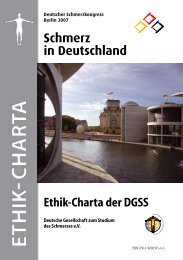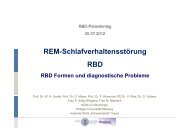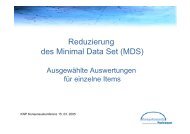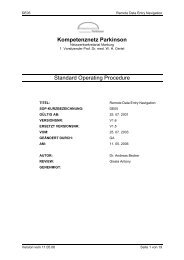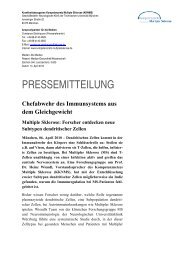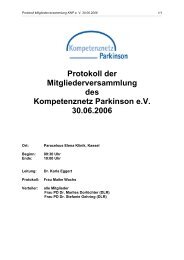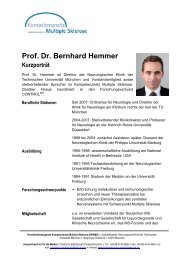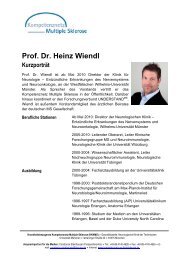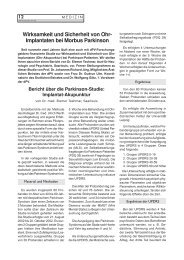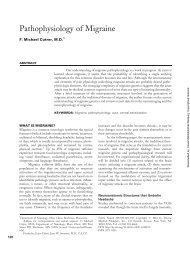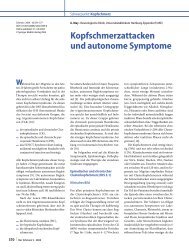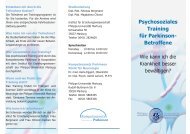Ethical Guidelines for Investigations of Experimental Pain in ...
Ethical Guidelines for Investigations of Experimental Pain in ...
Ethical Guidelines for Investigations of Experimental Pain in ...
Create successful ePaper yourself
Turn your PDF publications into a flip-book with our unique Google optimized e-Paper software.
<strong>Ethical</strong> <strong>Guidel<strong>in</strong>es</strong> <strong>for</strong> <strong>Investigations</strong> <strong>of</strong> <strong>Experimental</strong> <strong>Pa<strong>in</strong></strong> <strong>in</strong> Conscious Animals 1<br />
(See <strong>Ethical</strong> <strong>Guidel<strong>in</strong>es</strong> <strong>for</strong> <strong>Pa<strong>in</strong></strong> Research <strong>in</strong> Humans)<br />
The Committee <strong>for</strong> Research and <strong>Ethical</strong> Issues <strong>of</strong> the International Association<br />
<strong>for</strong> the Study <strong>of</strong> <strong>Pa<strong>in</strong></strong> (IASP®) is concerned with the ethical aspects <strong>of</strong> studies<br />
produc<strong>in</strong>g experimental pa<strong>in</strong> and any suffer<strong>in</strong>g it may cause <strong>in</strong> animals. Such<br />
studies are essential if new and cl<strong>in</strong>ically relevant knowledge about the<br />
mechanisms <strong>of</strong> pa<strong>in</strong> is to be acquired. <strong>Investigations</strong> <strong>in</strong> conscious animals<br />
<strong>in</strong>tended to stimulate chronic pa<strong>in</strong> <strong>in</strong> man are be<strong>in</strong>g per<strong>for</strong>med. Such<br />
experiments require careful plann<strong>in</strong>g to avoid or at least m<strong>in</strong>imize pa<strong>in</strong> <strong>in</strong> the<br />
animals.<br />
Investigators <strong>of</strong> animals models <strong>for</strong> chronic pa<strong>in</strong>, as well as those apply<strong>in</strong>g acute<br />
pa<strong>in</strong>ful stimuli to animals, should be aware <strong>of</strong> the problems pert<strong>in</strong>ent to such<br />
studies and should make every ef<strong>for</strong>t to m<strong>in</strong>imize pa<strong>in</strong>. They should accept a<br />
general attitude <strong>in</strong> which the animal is regarded not as an object <strong>for</strong> exploitation,<br />
but as a liv<strong>in</strong>g <strong>in</strong>dividual.<br />
In practice, <strong>in</strong>vestigators engaged <strong>in</strong> research on pa<strong>in</strong> <strong>in</strong> animals should consider<br />
the follow<strong>in</strong>g guidel<strong>in</strong>es aimed at m<strong>in</strong>imiz<strong>in</strong>g pa<strong>in</strong> <strong>in</strong> animals and , when<br />
submitt<strong>in</strong>g a manuscript, state explicitly that they have been followed. The<br />
guidel<strong>in</strong>es are concerned with the importance <strong>of</strong> the <strong>in</strong>vestigation, the severity<br />
and the duration <strong>of</strong> the pa<strong>in</strong>.<br />
1. It is essential that the <strong>in</strong>tended experiments on pa<strong>in</strong> <strong>in</strong> conscious animals be<br />
reviewed be<strong>for</strong>ehand by scientists and lay-persons. The potential benefit <strong>of</strong> such<br />
experiments to our understand<strong>in</strong>g <strong>of</strong> pa<strong>in</strong> mechanisms and pa<strong>in</strong> therapy needs to<br />
1 International Association <strong>for</strong> the Study <strong>of</strong> <strong>Pa<strong>in</strong></strong> [homepage on the Internet].<br />
<strong>Ethical</strong> guidel<strong>in</strong>es <strong>for</strong> <strong>in</strong>vestigations <strong>of</strong> experimental pa<strong>in</strong> <strong>in</strong> conscious animals.<br />
Available from: http://www.iasp-pa<strong>in</strong>.org/AM/Template.cfm?Section=Home
e shown. The <strong>in</strong>vestigator should be aware <strong>of</strong> the ethical need <strong>for</strong> a cont<strong>in</strong>u<strong>in</strong>g<br />
justification <strong>of</strong> his <strong>in</strong>vestigations.<br />
2. If possible, the <strong>in</strong>vestigator should try the pa<strong>in</strong> stimulus on himself; this<br />
pr<strong>in</strong>ciple applies <strong>for</strong> most non-<strong>in</strong>vasive stimuli caus<strong>in</strong>g acute pa<strong>in</strong>.<br />
3. To make possible the evaluation <strong>of</strong> the levels <strong>of</strong> pa<strong>in</strong>, the <strong>in</strong>vestigator should<br />
give a careful assessment <strong>of</strong> the animal's deviation from normal behavior. To this<br />
end, physiological and behavioral parameters should be measured. The outcome<br />
<strong>of</strong> this assessment should be <strong>in</strong>cluded <strong>in</strong> the manuscript.<br />
4. In studies <strong>of</strong> acute or chronic pa<strong>in</strong> <strong>in</strong> animals measures should be taken to<br />
provide a reasonable assurance that the animal is exposed to the m<strong>in</strong>imal pa<strong>in</strong><br />
necessary <strong>for</strong> the purposes <strong>of</strong> the experiment.<br />
5. An animal presumably experienc<strong>in</strong>g chronic pa<strong>in</strong> should be treated <strong>for</strong> relief<br />
<strong>of</strong> pa<strong>in</strong>, or should be allowed to self-adm<strong>in</strong>ister analgesic agents or procedures,<br />
as long as this will not <strong>in</strong>terfere with the aim <strong>of</strong> the <strong>in</strong>vestigation.<br />
6. Studies <strong>of</strong> pa<strong>in</strong> <strong>in</strong> animals paralyzed with a neuromuscular block<strong>in</strong>g agent<br />
should not be per<strong>for</strong>med without a general anesthetic or an appropriate surgical<br />
procedure that elim<strong>in</strong>ates sensory awareness.<br />
7. The duration <strong>of</strong> the experiment must be as short as possible and the number<br />
<strong>of</strong> animals <strong>in</strong>volved kept to a m<strong>in</strong>imum.<br />
The <strong>in</strong>vestigators should cooperate with the Committee <strong>for</strong> Research and <strong>Ethical</strong><br />
Issues or seek its advice. It is expected that responses from readers will help to<br />
improve these guidel<strong>in</strong>es. The Committee <strong>in</strong>tends to edit a comprehensive set <strong>of</strong><br />
guidel<strong>in</strong>es aimed at giv<strong>in</strong>g advice to <strong>in</strong>vestigators, local ethical committees and<br />
editors <strong>of</strong> journals who may be concerned with animal experiments on pa<strong>in</strong>, or<br />
with general animal experimentation <strong>in</strong>volv<strong>in</strong>g pa<strong>in</strong><br />
The above <strong>Guidel<strong>in</strong>es</strong> have been approved by the Council <strong>of</strong> IASP <strong>in</strong> December<br />
1982. They replace a previously published version and account <strong>for</strong> comments<br />
and suggestions <strong>of</strong> scientists as solicited <strong>in</strong> a Newsletter <strong>of</strong> IASP (<strong>Pa<strong>in</strong></strong>, 13/2;<br />
1982).
The Committee suggests that all those concerned should read the follow<strong>in</strong>g<br />
publications:<br />
Bowd, A.D., Ethics and animal experimentation, Amer. Psychol., 35 (1980) 224-<br />
225.<br />
Cov<strong>in</strong>o, B.G., Dubner, R., Gybels, J., Kosterlitz, H.W., Liebesk<strong>in</strong>d, J.C.,<br />
Sternbach, R.A., Vyklicky, L., Yamamura, H. and Zimmermann, M., <strong>Ethical</strong><br />
Standards <strong>for</strong> <strong>Investigations</strong> <strong>of</strong> <strong>Experimental</strong> <strong>Pa<strong>in</strong></strong> <strong>in</strong> Animals, <strong>Pa<strong>in</strong></strong>, 9 (1980) 141-<br />
143.<br />
Halsbury, The Earl <strong>of</strong>, Ethics and the exploitation <strong>of</strong> animals, Conquest, 164<br />
(1973) 2-11.<br />
H<strong>of</strong>f, C., Immoral and moral uses <strong>of</strong> animals, New Engl. J. Med., 302 (1980) 115-<br />
118.<br />
Iggo, A., <strong>Experimental</strong> study <strong>of</strong> pa<strong>in</strong> <strong>in</strong> animals: ethical aspects. In: Bonica, J.J.,<br />
Liebesk<strong>in</strong>d, J.C. and Albe-Fessard, D.G. (Eds), Advances <strong>in</strong> <strong>Pa<strong>in</strong></strong> Research and<br />
Therapy, Vol. 3, Raven Press, New York, 1979, pp. 773-778.<br />
Smyth, D.HY., Alternatives to Animal Experiments, Scolar-RDS, London, 1978.<br />
Sternbach, R.A., The need <strong>for</strong> an animal model <strong>of</strong> chronic pa<strong>in</strong>, <strong>Pa<strong>in</strong></strong>, 2 (1976) 2-<br />
4.<br />
Wall, P.D., Editorial, <strong>Pa<strong>in</strong></strong>, 1 (1975) 1-2.<br />
Wall, P.D., Editorial, <strong>Pa<strong>in</strong></strong>, 2 (1976) 1.<br />
For the Committee: Manfred Zimmermann, Chairman 1978-1990, Heidelberg<br />
(Germany)<br />
<strong>Ethical</strong> <strong>Guidel<strong>in</strong>es</strong> <strong>for</strong> <strong>Pa<strong>in</strong></strong> Research <strong>in</strong> Humans<br />
The follow<strong>in</strong>g <strong>Ethical</strong> <strong>Guidel<strong>in</strong>es</strong> are the product <strong>of</strong> a lengthy period <strong>of</strong><br />
deliberation by the Committee on <strong>Ethical</strong> Issues <strong>of</strong> the International Association<br />
<strong>for</strong> the Study <strong>of</strong> <strong>Pa<strong>in</strong></strong> (IASP®). The guidel<strong>in</strong>es published here have been<br />
approved, after modification, by the Council <strong>of</strong> IASP.
These guidel<strong>in</strong>es may not be perfect and are <strong>in</strong>tended to stimulate debate among<br />
members. Council <strong>of</strong> IASP encourages suggestions <strong>for</strong> improvement which can<br />
be made through the correspondence columns <strong>of</strong> this journal or directly to the<br />
current chairman <strong>of</strong> the Committee on <strong>Ethical</strong> Issues: Dr. George Mendelson,<br />
Suite 18, 33 Queens Road, Melbourne, VIC 3004, Australia.<br />
Membership <strong>of</strong> the Committee on <strong>Ethical</strong> Issues has undergone much change<br />
dur<strong>in</strong>g the preparation <strong>of</strong> these guidel<strong>in</strong>es and names <strong>of</strong> members who<br />
contributed are pr<strong>in</strong>ted at the end <strong>of</strong> this article.<br />
E. Charlton<br />
Secretary IASP<br />
<strong>Ethical</strong> <strong>Guidel<strong>in</strong>es</strong> <strong>for</strong> <strong>Pa<strong>in</strong></strong> Research <strong>in</strong> Humans<br />
The International Association <strong>for</strong> the Study <strong>of</strong> <strong>Pa<strong>in</strong></strong> (IASP) endorses the ethical<br />
pr<strong>in</strong>ciples <strong>for</strong> research <strong>in</strong>volv<strong>in</strong>g human subjects given <strong>in</strong> the follow<strong>in</strong>g<br />
documents: the World Medical Association's Declaration <strong>of</strong> Hels<strong>in</strong>ki,<br />
Recommendations Guid<strong>in</strong>g Doctors <strong>in</strong> Cl<strong>in</strong>ical Research (1964, revised 1975),<br />
the Ethic Pr<strong>in</strong>ciples <strong>of</strong> the American Psychological Association (1973), the<br />
Declaration <strong>of</strong> Lisbon, the Rights <strong>of</strong> the Patient (1981), the proposed International<br />
<strong>Guidel<strong>in</strong>es</strong> <strong>for</strong> Biomedical Research Involv<strong>in</strong>g Human Subjects, and Council <strong>for</strong><br />
International Organizations <strong>of</strong> Medical Sciences (1982).<br />
IASP believes further guidel<strong>in</strong>es are necessary to supplement the ethical<br />
pr<strong>in</strong>ciples conta<strong>in</strong>ed <strong>in</strong> these documents.<br />
The goal <strong>of</strong> pa<strong>in</strong> research is to acquire new knowledge on the mechanisms,<br />
pathogenesis, diagnosis, and treatment <strong>of</strong> pa<strong>in</strong>. This requires research on<br />
humans and animals. Human research may be undertaken on both healthy<br />
persons and patients. This research may <strong>in</strong>volve pa<strong>in</strong>ful stimuli or delay<strong>in</strong>g pa<strong>in</strong>
elief <strong>in</strong> patients. The primary <strong>in</strong>tention is to advance knowledge so that patients<br />
<strong>in</strong> general may benefit; the <strong>in</strong>dividual patient may or may not benefit directly.<br />
<strong>Guidel<strong>in</strong>es</strong><br />
The health, safety and dignity <strong>of</strong> human subjects have the highest priority <strong>in</strong> pa<strong>in</strong><br />
research. The <strong>in</strong>vestigator is personally responsible <strong>for</strong> the conduct <strong>of</strong> research<br />
and its effects on the experimental subject at all times, even though the patients<br />
have given their consent to participate.<br />
1. Be<strong>for</strong>e start<strong>in</strong>g any study <strong>of</strong> human subjects, the proposed experimental<br />
protocol must be reviewed and approved by an <strong>in</strong>dependent committee on<br />
human research. The functions <strong>of</strong> the committee are as follows:<br />
2. a) to ensure that participants are not coerced or harmed,<br />
b) to evaluate the potential <strong>for</strong> undesirable physical or psychological effects<br />
occurr<strong>in</strong>g dur<strong>in</strong>g the research,<br />
c) to decide whether the proposed research should be the subject <strong>of</strong> regular<br />
review.<br />
The committee should be appropriately constituted and normally should<br />
<strong>in</strong>clude scientists, health care practitioners and lay members.<br />
The scientific merit <strong>of</strong> the proposal and the research methods proposed normally<br />
should be the subject <strong>of</strong> <strong>in</strong>dependent evaluation by an appropriately constituted<br />
peer review committee. The scientific review process normally should take place<br />
be<strong>for</strong>e the consideration <strong>of</strong> ethical matters.<br />
1. Potential participants should be <strong>in</strong><strong>for</strong>med fully about the goals, procedures<br />
and risks <strong>of</strong> the study be<strong>for</strong>e giv<strong>in</strong>g their consent.<br />
2. Healthy subjects and patients must be able to decl<strong>in</strong>e, or to term<strong>in</strong>ate,<br />
participation at any stage without risk or penalty whatsoever.
3. Written consent must be obta<strong>in</strong>ed to <strong>in</strong>dicate that the subject understands<br />
the nature and purpose <strong>of</strong> the proposed study, has had the opportunity to ask<br />
questions and agrees to participate on a voluntary basis. Where possible,<br />
<strong>in</strong><strong>for</strong>med consent should be endorsed by an <strong>in</strong>dependent signatory.<br />
4. There is a duty to protect those who may be <strong>in</strong>capable <strong>of</strong> giv<strong>in</strong>g fully<br />
<strong>in</strong><strong>for</strong>med and voluntary consent. These <strong>in</strong>clude children, the elderly, the mentally<br />
handicapped, prisoners and those very ill with other disease. Such persons<br />
should not be used <strong>for</strong> medical research unless they are essential <strong>for</strong> the goals <strong>of</strong><br />
the proposed research. In such cases, consent must be obta<strong>in</strong>ed also from those<br />
who have legal responsibility <strong>for</strong> their welfare.<br />
5. In any pa<strong>in</strong> research, stimuli should never exceed a subject's tolerance limit<br />
and subjects should be able to escape or term<strong>in</strong>ate a pa<strong>in</strong>ful stimulus at will. The<br />
m<strong>in</strong>imal <strong>in</strong>tensity <strong>of</strong> noxious stimulus necessary to achieve goals <strong>of</strong> the study<br />
should be established and not exceeded.<br />
6. In all circumstances, <strong>in</strong>clud<strong>in</strong>g studies that employ placebo and sham<br />
treatment methods, an effective, accepted method <strong>of</strong> pa<strong>in</strong> relief must be provided<br />
on request <strong>of</strong> the patient or subject. The availability <strong>of</strong> alternative pa<strong>in</strong> relief<br />
should be made clear <strong>in</strong> the consent <strong>for</strong>m and the <strong>in</strong>struction be<strong>for</strong>e the study<br />
beg<strong>in</strong>s.<br />
References<br />
American Psychological Association, <strong>Ethical</strong> Pr<strong>in</strong>ciples <strong>in</strong> the Conduct <strong>of</strong><br />
Research with Human Participants, 1973, pp. 58-69.<br />
Council <strong>for</strong> International Organizations <strong>of</strong> Medical Sciences, Proposed<br />
International <strong>Guidel<strong>in</strong>es</strong> <strong>for</strong> Biomedical Research Involv<strong>in</strong>g Human Subjects,<br />
1982.<br />
World Medical Association, Declaration <strong>of</strong> Hels<strong>in</strong>ki: Recommendations Guid<strong>in</strong>g<br />
Doctors <strong>in</strong> Cl<strong>in</strong>ical Research, 1964, revised edition, Tokyo, 1975.<br />
World Medical Association, Declaration <strong>of</strong> Lisbon: The Rights <strong>of</strong> a Patient, 1981.
Further Read<strong>in</strong>g<br />
McNeill, P.M., The Ethics and Politics <strong>of</strong> Human Experimentation, Cambridge<br />
University Press, Cambridge, 1993.<br />
Membership <strong>of</strong> the Committee on <strong>Ethical</strong> Issues<br />
C. Benedetti, Columbus, Ohio (USA)<br />
M.R. Bond, Glasgow, Scotland (UK) - Chairman 1990-1993<br />
K.L. Casey, Ann Arbor, Michigan (USA)<br />
J.E. Charlton, Newcastle upon Tyne (UK) - Chairman 1993<br />
M.L. Cous<strong>in</strong>s, St. Leonards, NSW (Australia)<br />
R. Dubner, Baltimore, Maryland (USA)<br />
G.F. Gebhart, Iowa City, Iowa (USA)<br />
U. L<strong>in</strong>dblom, Stockholm (Sweden)<br />
L. Vyklicky, Prague (Czechoslovakia)<br />
T. Yokota, Seta Otsu (Japan)<br />
M. Zimmermann, Heidelberg (Germany) - Chairman 1978-1990<br />
IASP Executive Committee ex <strong>of</strong>ficio



